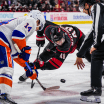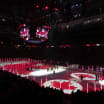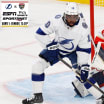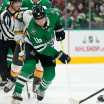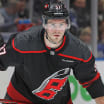For the Washington Capitals to win the first Stanley Cup championship in their 43-season history, they will rely on the power play, Braden Holtby's goaltending, high shot volumes from forward Alex Ovechkin and center Evgeny Kuznetsov, and defenseman Brooks Orpik's experience in the Stanley Cup Playoffs.
Let's examine the underlying numbers behind each of these requirements. Game 1 of the best-of-7 Stanley Cup Final against the Vegas Golden Knights is at T-Mobile Arena on Monday (8 p.m. ET; NBC, CBC, SN, TVAS).
Capitals have edge in Cup Final with power play, Holtby's hot hand
Underlying numbers suggest high shot volume, experience may tip scales against Golden Knights

© Icon Sportswire/Getty Images



